Technological innovation and search for consensus: the Italian Wars (1521-1559)
DOI:
https://doi.org/10.13133/2723-9489/1482Parole chiave:
Consensus, Mediation, Patronage, Attrition war, State-building, Renaissance, Political factions, ExilesAbstract
The essay reconsiders the Military Revolution theory, in the light of the most recent studies dedicated to the exchange of favour and service between sovereign power and the elite, to the imperial systems and to the dynamics in the relations between centres of power and between interest groups within polycentric monarchies during the early modern age. In particular, the argumentation focuses on the attrition war between the Habsburgs and the Valois for hegemony on the Italian peninsula, confirming the validity of Geoffrey Parker’s thesis. For the great monarchies struggling for supremacy in the Euro-Mediterranean area, the resort to new and expensive offensive and defensive technologies was a stimulus to seek their subjects’ consensus, by encouraging great nobles to join the patronage network of the sovereign, and by strengthening and articulating those formal structures (the court and the financial and judicial bureaucracy) which made it possible to mediate internal conflicts and to coordinate elites’ contribution to the war effort.
##submission.downloads##
Pubblicato
Fascicolo
Sezione
Licenza
Copyright (c) 2023 Rabà Michele Maria

Questo lavoro è fornito con la licenza Creative Commons Attribuzione - Non commerciale - Condividi allo stesso modo 4.0 Internazionale.


